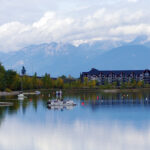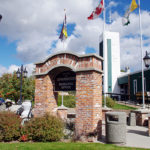Home »

Climate change or an expensive hoax? You decide
 “Perceptions,” by Gerry Warner
“Perceptions,” by Gerry Warner
Op-Ed Commentary
So, it’s the beginning of December and where is winter? Just arrived in Cranbrook and it’s also been balmy in the rest of the province too. What’s going on? As a believer in climate change, I could use this as a cheap opportunity to debunk all the climate change deniers out there including a famous president I won’t bother to name.
But that would be a cheap shot and I’m not going there.
That aside, climate change is in the news almost every day and deservedly so because even though naysayers abound scientists around the world are united based on hard evidence that our world is warming so rapidly that it endangers our very existence as well as biological life itself.
Here’s what the latest report from the International Panel on Climate Change (IPCC) said a month ago.
“For some people this is a life-or-death situation, without a doubt,” said Cornell University climate scientist Natalie Mahowald, a lead author on the report. For years, climate scientists said two degrees Celsius above pre-industrial levels was the maximum amount the Earth’s climate could warm without igniting a catastrophic chain of climate disasters. But after the latest research was completed, the limit was dropped to one-degree-C and some scientists say it should be reduced to half-a-degree C to prevent disaster to low lying countries and coastal cities world-wide.
And what are the chances that global warming can be reduced that much?
“There is no definitive way to limit global temperature rise to 1.5 above pre-industrial levels,” the UN-requested report said. So where does that leave us? Caught between a rock and a hard place, as deadly carbon saturates our atmosphere.
And lest you think climate change disasters are an abstract threat confined to other parts of the world and not the Kootenays, you’d better think again, according to climate scientist Mel Reasoner.
Speaking at a wildfire and climate change conference in Nelson last June, Reasoner said temperature and precipitation are both on an upward trajectory in the Kootenays with the average mean temperature expected to climb by 2.6 C by mid-century, according to a story in the Nelson Star. This means more wild fires and shorter ski seasons, which will hit the tourism industry hard because of smoke in the summer and less snow in the winter.
Using Cranbrook as an example, Reasoner said computer modelling showed no probability of summer temperatures exceeding 41 C until around 2030. Despite this, Cranbrook’s temperature climbed to 40.4 C Aug. 10 this year, a new record high, showing that extreme temperatures are happening even more quickly than the computer models had predicted.
Drought and extreme wildfires are the “new normal” in B.C. with last summer’s heat wave breaking 64 records and dense grey smoke smothering the province almost the entire month of August.
Thomas Pedersen, executive director of the Pacific Institute for Climate Solutions, said climate change is already hitting the province hard.
There are 17,000 glaciers in the province and they’re all melting fast, he said. This includes the huge glaciers in the Bugaboo Range, tiny Dibble Glacier on the backside of The Steeples just outside of Cranbrook and the once large Kokanee Glacier near Nelson.
Implications of the melting are “profound” because it reduces hydro power production in the fall, causes fewer salmon to spawn in late summer and a fire season that runs well into autumn, Pedersen said.
Despite the well documented impacts of climate change in B.C. and elsewhere, deniers of climate change still like to deny.
“Climate Change is merely a phrase that describes all weather as it has always been and always will be,” said National Post columnist Rex Murphy in a Nov. 16 column where he went on to accuse climate change believers of having a “moral disease.” Shortly, after he was elected Ontario Premier, Doug Ford called cap-and-trade and other carbon reduction programs “government cash grabs that do nothing for the environment” while President Trump calls climate change “an expensive hoax.”
What do you say?
Lead image: The retreating Dibble Glacier on the backside of the Steeples. Gerry Warner photo
– Gerry Warner is a retired journalist who believes global warming is taking place at an alarming speed and is a mix of natural and man-made causes.







